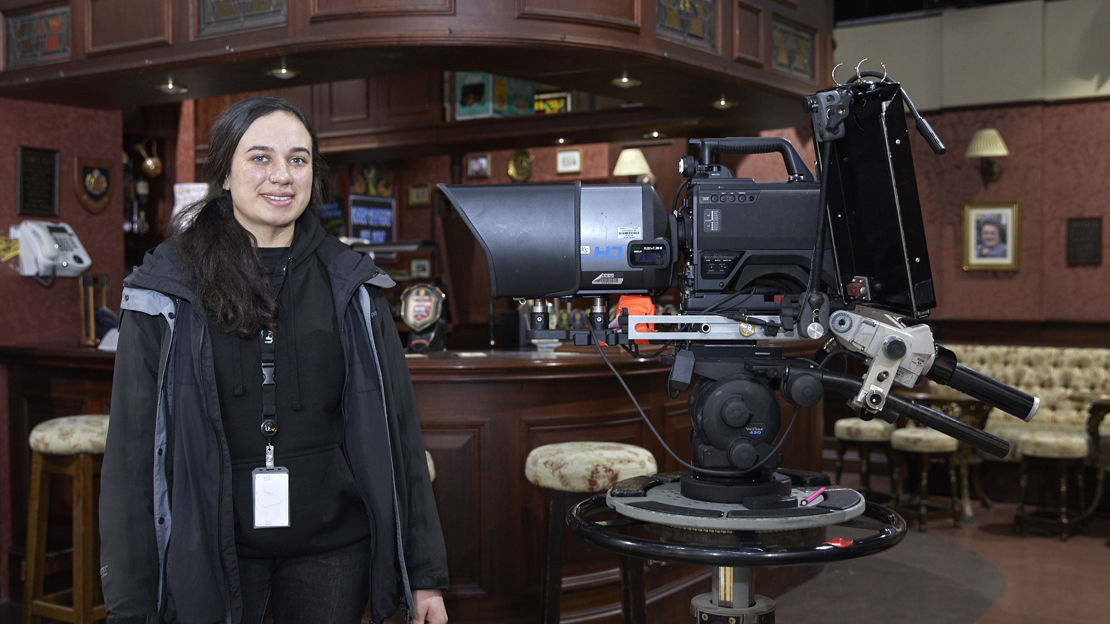At just 19, Jade Marney James laughs when describing herself as the baby of the ScreenSkills First Break programme. Living “round the corner” from ITV Studios in Trafford, Manchester, Jade was looking for hands-on experience in production and knew First Break would provide just that.
She went to college in central Manchester and studied creative media production. “It gave me some knowledge about film and television- but it didn't give me as much hands-on learning as I thought,” Jade says. “It was more about assignments and writing things down. I thought this (First Break) would be a good way to actually do practical stuff.”
During the three-week paid placement with ITV’s flagship continuing drama Coronation Street, Jade has worked in the camera department, post-production and has also been a runner.
“Before this I thought editing would be what I would want to do because that's what I enjoy when I make my own videos - editing the videos,” she says. “Now that I've come here, I've liked everything, but you get to see a lot more running. You get to meet a lot more people, same with camera - you're on the floor and you get to see the whole set and it working.”
When she is not working in a local Wetherspoon pub, Jade works at Gorse Hill Studios, a community project revolving around non-mainstream education for young people, as a videographer. “I used to go there [Gorse Hill Studios] as a young person. My interest in video started when I was really young. My mum used to do stop motion workshops and I used to go to them. I’ve always been around creatives.”
Designed to introduce participants to the television production process and help them understand the formal structure of producing continuing drama, ScreenSkills’ First Break is supported by the High-end TV Skills Fund, with contributions from UK high-end TV productions. The first iteration of the programme has been delivered in partnership with ITV.
Jade describes First Break as a step into the industry. Like many First Break participants, the sheer range of job roles and the scale of the show surprised her. “It definitely works like a well-oiled machine,” she says.
A typical day on the placement saw Jade begin at 8 am by checking call sheets and finding out where she was going to be for the day. That could mean on the exterior street set, in the studio or on location.
She thinks it is the people who have been the most helpful part of her First Break experience. “That is what I was most apprehensive about before coming here. I was very excited but nervous that everyone would be really serious,” she says. “But although they do all get on with their job when they need to, everyone is chatty and lovely.” Before she started, she thought everyone would be very business-like.
Her favourite part of the placement has been working cameras and in editing. "I'd never seen anything like it before, I was soaking it all in. Meeting people in the industry and them sharing their knowledge with me was my favourite part,” she says.
Standing out in the rain for long stints wasn’t much fun. "Living in Manchester, you'd think I'd be used to it by now," Jade laughs. "They do give you hand warmers which is good.”
Jade now feels like she could work in television as a career. “I was nervous coming in but now I've done it, I feel like I could get used to it.”
Before undertaking the First Break placement, she says she feels she would have been unlikely to look for trainee jobs in television. But now she is going to - cameras or being a runner have piqued her interest. “Running was what I did first. You get to see the studios and you're running around and seeing everyone.”
Wetherspoon gave Jade three weeks unpaid leave to do First Break. She was safe in the knowledge that the placement would pay her a living wage. "I'd be a bit stuck if it didn't pay. Rent to pay, bills too.” The fact the placement is paid "makes you feel valued,” she added.
